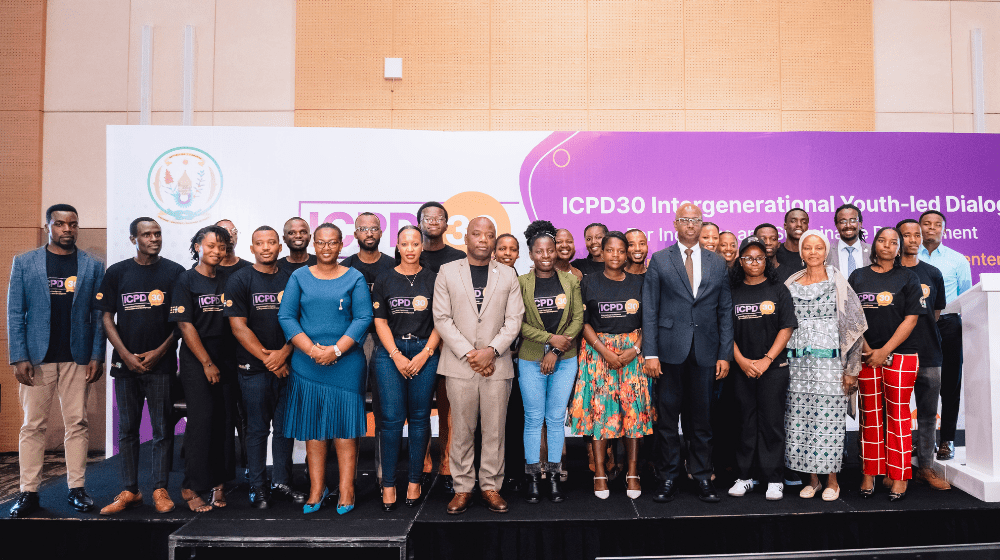Kigali, Rwanda – Thirty years ago, the International Conference on Population and Development (ICPD) in Cairo marked a transformative moment in global development. Leaders from 179 nations embraced a people-centered framework, recognizing that human rights, gender equality, and access to quality sexual and reproductive health (SRH) services are essential to achieving sustainable development. Today, 30 Years later, Rwanda's youth are taking center stage to continue this vision, shaping policies and actions to create a brighter, inclusive future.
At a high-level Intergenerational Youth-led Dialogue on ICPD30, organized by the Ministry of Finance and Economic Planning (MINECOFIN), AfriYAN Rwanda, and UNFPA Rwanda on December 6th 2025, young leaders, policymakers, and stakeholders gathered to reflect on Rwanda’s progress and chart the way forward. The dialogue builds on Rwanda’s commitments to the ICPD Programme of Action (PoA) and the recommendations of the Global Youth Dialogue on ICPD30 held earlier this year in Cotonou, Benin.
Since adopting the ICPD PoA in 1994, Rwanda has made significant strides in improving maternal and child health, enhancing education access, and promoting gender equality. The government’s alignment of the ICPD goals with its Vision 2050 underscores the nation’s dedication to inclusive growth and sustainable development.
However, challenges persist. Ensuring universal access to integrated SRH services, combating gender-based violence, and achieving gender equality remain priorities. As the 2030 deadline for the Sustainable Development Goals (SDGs) approaches, the urgency to fulfill the ICPD promises grows.
Speaking at the event, the Vice-Chair of Members at AfriYAN Rwanda, Mr. Anastase Ndagijimana emphasized the pivotal role of young people in shaping sustainable solutions.
Today’s youth are not just leaders of tomorrow; they are active drivers of the present. Their voices, ideas, and actions are central to crafting inclusive policies and transformative solutions. Anastase Noted.
Dr. Olugbemiga Adelakin, the UNFPA Representative in Rwanda reiterated the importance of youth engagement in advancing the ICPD agenda.
One of the commitments at the Nairobi Summit was to ensure that nothing about young people’s health and wellbeing can be discussed and decided upon without their meaningful involvement and participation—‘nothing about us, without us. He noted.
He further highlighted the pivotal role of young people in shaping the future, noting that realizing sexual and reproductive justice is not only essential for achieving universal health coverage but is also deeply intertwined with the broader sustainable development agenda.
Rwanda’s Minister of Finance and Economic Planning, Mr. Yusuf Murangwa, reaffirmed the nation’s dedication to empowering its youthful population as a cornerstone of development.
Our commitment to achieving the ambitious development aspirations of Rwandans in Vision 2050 is unwavering. This commitment translates into our goal of progressing towards a Rwanda where every citizen has the opportunity to reach their full potential. Minister Yusuf highlighted.
Vision 2050 is very much about Rwanda's youth, both as beneficiaries and as the engine of any progress and development to be achieved. He added.
Through interactive panel discussions, the dialogue engaged participants in fruitful exchanges whereby representatives from government ministries, civil society, and youth organizations highlighted ongoing efforts, shared challenges, and outlined actionable sectoral recommendations. The dialogue served as a platform to unpack key recommendations from the Cotonou Youth Action Agenda, contextualizing them within Rwanda’s development framework.
Below Are the Key Recommendations from the Cotonou Youth Action Agenda:
My Body, My Life: Advocating for universal access to SRH services, gender-transformative education, and investments in comprehensive sexuality education.
Gender Equality: Addressing gender disparities, promoting inclusive policies for young mothers and marginalized groups, and combating gender-based violence.
Transforming Education: Expanding youth-led initiatives, equipping young people with life skills, and fostering innovation and entrepreneurship.
Resilience in Crisis: Amplifying youth leadership in peacebuilding, climate action, and humanitarian efforts.
Youth Voices Matter: Advocating for genuine youth participation in decision-making and sustainable support for youth-led organizations.


